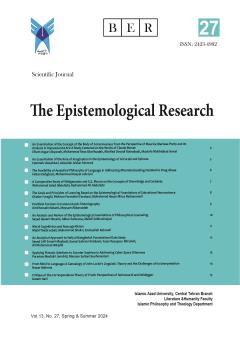Application of the Platonic solution to deal with the sophist in solving the problems of virtual space
Subject Areas : Epistemological researchesParastoo mesbahi jamshid 1 , Maryam Soltani Kouhanestani 2
1 - Department of Educational Sciences, Farhangian University, P.O. Box 14665-889, Tehran, Iran
2 - Assistant professor, Department of Philosophy, University of Mohaghegh Ardabili, Ardabil, Iran
Keywords: Cyberspace, sophistry, Plato, wisdom, rationality, spirituality,
Abstract :
Contemporary man, who lives in the era of information and communication technology and is in a sense under the control of Cyberspace, is faced with issues that have made it difficult for him to distinguish truth from error. This difficulty has the same nature as the epistemological problems of ancient Greece, which were created by the Sophists and solved by Plato's enlightenment. The aim of the current research is to investigate whether Plato's position against the sophists can be a solution to the problems of Syber space? This research has been carried out with a descriptive-analytical method and the findings indicate that although there is no absolute compatibility between the infrastructure and the content of the Cyberspace with the nature and practice of the sophist, and the basis and purpose of creating the Cyberspace is different from all kinds of sophistry which was done by the false claimants of philosophy; At the same time, in use, there is a significant closeness between these two procedures. Correspondence between sophistry and Cyberspace is clear in components such as the use of appearance instead of truth, opinion instead of knowledge, neglect of human knowledge, and the preference of speech or writing. The way out of the problems of Syberspace according to the Platonic approach is to pay attention to the two elements of "rationality" and "spirituality".
اسمیت،هیوستون،(1381)، اهمیت دینی پساتجددگرایی:یک جوابیه، سیری در سپهر جان- مقالات و مقولاتی در معنویت، ترجمه مصطفی ملکیان، تهران:انتشارات نگاه معاصر.
برگر،پترل، توماس لوکمان،(1394)،ساخت اجتماعی واقعیت، ترجمه فریبرز مجیدی، تهران:انتشارات اندیشه¬های عصرنو.
بل،دیوید،(1389)، درآمدی بر فرهنگ¬های سایبر، ترجمه مسعود کوثری و حسین حسنی،تهران:انتشارات جامعهشناسان.
بل،دیوید،(1390)،نظریه پردازان فرهنگ سایبری، مانوئل کاستلز و دانا هاراوی، ترجمه مهدی شفیعیان، تهران:انتشارات دانشگاه امام صادق.
بودریار،ژان،(1387)، درسایه اکثریت¬های خاموش، ترجمه پیام یزدانجو،تهران:انتشارات مرکز.
جرج، سوزان،(1390)، دین و تکنولوژی در قرن بیست و یکم، تهران:انتشارات پژوهشگاه فرهنگ، هنر و ارتباطات.
جوادی آملی، عبدالله، (1391)، منزلت عقل در هندسه معرفت دینی، قم، اسراء.
حسن،ایهاب،(1381)، پست¬مدرنیسم کتابنامه¬ای نقدگونه، ترجمه مهتاب ملکوت، از مدرنیسم تا پستمدرنیسم،(مجموعه مقالات)،لارنس کهون، تهران:انتشارات نی.
دریفوس،هیوبرت،(1383)، نگاهی فلسفی به اینترنت، تهران:انتشارات گام نو.
رشیدیان، عبدالکریم،(1393)، فرهنگ پستمدرن،تهران:انتشارات نی.
سلیمانی امیری، جواد (1397) تطبیق تاریخی، امکان سنجی و معیارشناسی، تاریخ اسلام در آیینه پژوهش، 44 (1)، 29-55.
صلواتی، عبدالله، (1401) باور در عصر کلیک (آسیب¬های اعتقادی فضای مجازی و راهکارهای آن)، تهران، کانون اندیشه جوان.
صلواتی، عبدالله، (1400) تحول معرفت شناختي فضای مجازی، تهران،انتشارات سمت.
عاملی، سعیدرضا (1397) فلسفه فضای مجازی، تهران، امیرکبیر.
عاملی، سعیدرضا،(1382)، دو جهانی شدن و جامعه جهانی اضطراب، نامه علوم اجتماعی، سال یازدهم، شماره اول
گلشنی، مهدی،(1379)، علم و دین و معنویت در آستانه قرن بیست و یکم، تهران:پژوهشگاه علوم انسانی و مطالعات فرهنگی
مک لوهان،مارشال،(1377)، هربرت، برای درک رسانه¬ها، ترجمه سعید آذری، تهران:انتشارات مرکز تحقیقات، مطالعات و سنجش برنامه¬ای صدا و سیما
یی¬گاست، خوزه ارتگا،(1381)،پدیده ازدحام توده¬ها، ترجمه حسین بشیریه، از مدرنیسم تا پست مدرنیسم، (مجموعه مقالات)، لارنس کهون، تهران:انتشارات نی
#Bakardjieva,M.Internet Society:The Internet in Everyday Life:computer networking from the standpoint of the domestic user, New Media & Society 3: 67-83.2005#
#Benedikt,M,Cyberspace:some proposals,in M.Benedikt(ed)Cyberspace: First Steps,Cambridge,MA:MIT Press,1991#
#Castells,M,Epilogue:informationalism and the network society,in P.Himanen,The Hacker Ethic and the Spirit of the Information Age,London:Secker&arburg,2001#
#Kraut.R,M.Patterson,V.Lundmark SKiesler,T.Mukophadhyay and W.Scherlis Internet Paradox:A Social Technology that Reduces Social Lnvolvement and Psychological well-deing?American Psychologist, vol.53,no.9,pp.1017-31, 1998#
#Stivale,C. (1998).The Two-Fold Thought of Deleuze and Guattari:intersections and animations,London: Guilford P.71#
#Turkie,S.Life on the Screen:Identity in the Age of the Internet,London:Secker&Warburg,1995#
#Whittle,David B,(1997),Cyberspace:The Human Dimension,New York. W.H.Freeman,Winter, Vol 1#
#Guthrie,W.K.C,(1975),A History of Greek Philosophy:Plato:The man and his dialogues earlier period; Vol.IV,Cambridge University Press, London#
#Plato;(1997),complete works;edithed with John M.Cooper,Hackett publishing company,Inc,U.S.A#
#Liddell H.G&Scott.R,(1996),Greek-English Lexicon:With a Revised Supplement By Sir Henry Stuart Johnes,Clarendon Press,Oxford#
#Zeller,Eduard.(1980),Outlines of the History of Greek Philosophy;translated by:l.r.palmer, Dover Publication,new York#
#Ropolyi, laszlo (2013), Philosophy of the Internet: A Discourse on the Nature of the Internet, Eotvos Lorand Tudomanyegyetem#


